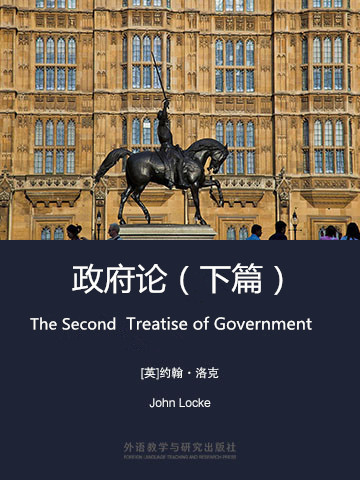《政府论》是英国约翰·洛克(John Locke)于1690年出版的政治著作,汇集了洛克的主要政治哲学思想,不仅使洛克成为古典自由主义思想的集大成者,而且对于后世的现实政治产生了深远的影响。该书分为上下两篇,上篇集中驳斥了当时占统治地位的君权神授说和王位世袭论,下篇系统地阐述了公民政府的真正起源、范围、目的。全书出色完成了为英国资产阶级革命辩护的任务,对英国政治、经济的发展起到了巨大的推动作用。
《政府论》是英国约翰·洛克(John Locke)于1690年出版的政治著作,汇集了洛克的主要政治哲学思想,不仅使洛克成为古典自由主义思想的集大成者,而且对于后世的现实政治产生了深远的影响。该书分为上下两篇,上篇集中驳斥了当时占统治地位的君权神授说和王位世袭论,下篇系统地阐述了公民政府的真正起源、范围、目的。全书出色完成了为英国资产阶级革命辩护的任务,对英国政治、经济的发展起到了巨大的推动作用。
Concerning Civil Government is a work of political philosophy by John Locke. It attacks patriarchalism in the form of sentence-by-sentence refutation of Robert Filmer's Patriarcha, and outlines Locke's ideas for a more civilized society based on natural rights and contract theory. From this, he goes on to explain the hypothetical rise of property and civilization, in the process explaining that the only legitimate governments are those that have the consent of the people. Therefore, any government that rules without the consent of the people can, in theory, be overthrown.
- Chapter I Of Political Power
- Chapter II Of the State of Nature
- Chapter Of the State of War
- Chapter IV Of Slavery
- Chapter V Of Property
- Chapter VI Of Paternal Power
- Chapter VII Of Political or Civil Society
- Chapter VIII Of the Beginning of Political Societies
- Chapter IX Of the Ends of Political Society and Government
- Chapter X Of the Forms of a Commonwealth
- Chapter XI Of the Extent of the Legislative Power
- Chapter XII The Legislative, Executive, and Federative Power of the Commonwealth
- Chapter XIII Of the Subordination of the Powers of the Commonwealth
- Chapter XIV Of Prerogative
- Chapter XV Of Paternal, Political and Despotical Power,Considered Together
- Chapter XVI Of Conquest
- Chapter XVII Of Usurpation
- Chapter XVIII Of Tyranny
- Chapter XIX Of the Dissolution of Government
- 书评 写书评
- 笔记
-
书评加载中...























 京公网安备 11010802032529号
京公网安备 11010802032529号
笔记加载中...